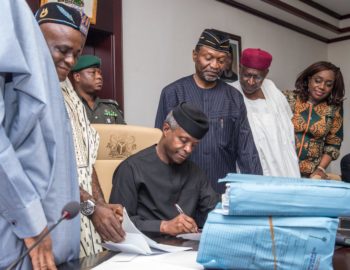
Some economists has called on the Federal Government to immediately begin implementation of the just signed 2017 budget to improve the country’s economic fortune.
Prof. Uche Uwaleke, an Associate Professor of Finance at the Nasarawa State University, said this in an interview with the Newsmen in Abuja on Tuesday.
Acting President Yemi Osinbajo on Monday signed the 2017 Appropriation Bill that was initially passed on May 11, by the National Assembly.
According to him, the immediate implementation of critical projects in the budget will help the country exit recession faster.
He also commended the Executive’s decision to sign the budget in spite of the N143 billion added to the budget by the National Assembly.
“It is nice that it was signed before the expiration of the 30 days grace given to the executive to sign the budget once passed by the National Assembly.
“If it had not been signed before the expiration date, it could have created a rift between the executive and the legislative arm of government.
“By signing the 2017 Appropriation Bill, we now have a functional budget, so it’s a welcome development. And it also means that the executive agrees with the amendments made by the legislature,’’ he said.
Jude Ndukwe, a Political-Economist, alleged that it took the executive more than 25 days to sign the budget due to “Cabalistic Power Play in Aso Rock’’.
“It was nothing but power play that has delayed the budget from being signed since it was passed on May 11.
“The cabals to prove a point, wanted to keep the budget until President Muhammadu Buhari returns and sign it himself. They waited until the last minute to allow the acting President sign it.
“It is so shameful that a document as important as our National Budget is being reduced to ridicule by the powers in Aso Rock,’’ he said.
The signed budget is N7.44 trillion, which is N143 billion higher than the estimates submitted by Buhari in December 2016.
The legislators also changed the crude oil benchmark from 42.50 dollars per barrel to 44.50 dollars per barrel at an exchange rate of N305 to a dollar.
According to the National Assembly, the increment is to accommodate the N5.8 billion repairs of Abuja Airport Runway, and N5.1 billion Increase in Personnel Cost of 18 Ministries, Departments and Agencies (MDAs).
The increment is also to accommodate the N1.2 billion UNESCO Assessed Contribution and N3.6 billion subscription to Shelter Afrique.
It also included an allocation of N2.5 billion for Economic Recovery and Growth Plan, N10 billion Amnesty Programme, N5 billion for National Identity Management Commission, and N25 billion for Nationwide road repairs.
The 2017 budget had Statutory transfer projections of N434.41 billion, N1.84 trillion for Debt Servicing and N177.46 billion for Sinking Fund from maturing bonds.
Recurrent Expenditure was estimated at N2.99 trillion, Capital Expenditure, N2.18 trillion and N2.36 trillion was allocated for Fiscal Deficit.
Highlight of the budget showed that the Ministry of Power, Works and Housing received the highest allocation of N586.54 billion.
The Ministry of Transport got N256.52 billion; while the Ministry of Education received N455.41 billion, and Ministry of Health N308.46 billion.